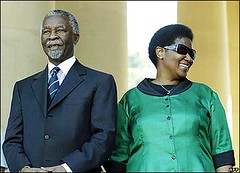
President and Deputy President of South Africa: Thabo Mbeki and Phumzile Mlambo-Ngucka
Originally uploaded by Pan-African News Wire Photo File.
Fri, 09 Feb 2007
Seven out of 10 South Africans are happy with the performance of President Thabo Mbeki, marketing survey company Markinor revealed on the eve of his State of the Nation address.
Mbeki was trusted by many poor, black people, the principle beneficiaries of his anti-poverty drive, SABC news reported.
Mbeki is expected to call for a greater national effort in the fight against poverty when he delivers his speech in Parliament on Friday.
According to the Markinor report, land, crime and unemployment are still a major concern.
However, close to 600 000 jobs were created last year and unemployment is down to around 26 percent. The R370-billion infrastructure investment plan could bring it down even further, the report added.
Sapa
Slow land reform a 'concern'
Fri, 09 Feb 2007
Slow land and agrarian reform was an area of concern, the Agriculture and Land Affairs Department said after a day-long review of the fast-tracking programme, Operation Gijima.
The project was launched more than a year ago to speed up land and agrarian reform and overhaul delivery systems, the Department said in a statement.
MECs said that while some people would be disgruntled and seek confrontation because of fast-paced land reform, Agriculture Minister Lulu Xingwana should not "release the pressure pedal".
"... That will not be in the interest of work and progress-loving people in the system and the sector as a whole," they told Xingwana, who was part of the discussions.
Sapa
-------------------------------------------------------------------------------------
Community Survey 2007: Measuring the state of our nation
A massive survey got underway this week, as Statistics South Africa launched Community Survey 2007, a 'mini-census' that aims to understand the living conditions and life circumstances of the nation. It will help to measure, in the words of Statician-General Pali Lehohla, "what has been achieved, what has not been achieved and what remains to be done against set targets".
The survey is different from a census because it does not aim to count the entire population. From 7-28 February Statistics South Africa (Stats SA) is deploying at least 5,800 employees to the streets of the country's towns, cities and villages to administer at least one million questionnaires in an effort to collect new statistical data about our people.
The community survey will bridge the gap created by the move from a census conducted every five years to one conducted in intervals of ten years. The first two censuses conducted in a democratic South Africa were five years apart, in 1996 and 2001. However, a decision has been taken that the country should now only conduct a census once every ten years.
Lehohla explained: "Owing to the magnitude and challenges of among others, recruitment, training, appointment, deployment, and decommissioning of 100,000 people in a space of six weeks, it was decided that a census be held in 2011 and a community survey covering 284,000 households be conducted instead in 2007. The census undertaking held regularly could weigh heavily on the capacity of the organisation to deliver on other core areas such as socio economic time series."
The Community Survey will provide small area data at the level of municipalities. This is critical for municipal Integrated Development Plans (IDPs), their planning, implementation, monitoring and assessment.
The survey will provide information similar to that provided by the censuses of 1996 and 2001 at a lower geographical level of municipality. This cannot be provided by current surveys, because they only cover 30,000 households. The community survey covers almost ten times what the current household surveys cover.
The nature and form of the data that will be required by the enumerators from Stats SA will include questions on the movement of people, which will provide information on the flow, direction and volume of movements. This will assist in understanding whether populations have grown or decreased in provinces and localities relative to each other.
The survey should produce some important information against which to assess progress in implementation of social policies intended to deal with poverty and underdevelopment. These policies range from free basic electricity and water to social grants and housing.
The community survey is part of the arsenal of tools intended to evaluate South Africa's progress since 1994, especially the impact of private sector and government policies and decisions. It should also help to answer questions about progress towards the achievement of the UN Millennium Development Goals.
Once the data has been gathered through the household visits, all questionnaires will be sent to Stats SA head office in Tshwane where they will be processed. All information will be confidential and personal details cannot be traced. The data will be released in aggregates.
"Through the survey we will be exposed to the living conditions of the population. So open your doors and hearts and welcome your partner in information. Remember the power of information," Lehohla said.
The community survey fieldworkers will ask questions that help understand the number of years that people live, and the number of years of working life, schooling and childhood.
But, as Lehohla notes: "To receive answers to these questions is always a problem among many South Africans. Some citizens always feel that we are intruding into their privacy once we ask as many important question of a personal nature as this. It must however be pointed out that society is made up of individuals, before they become a group; and therefore understanding individual dynamics are important to understand the group as a whole..."
"Once this data is available, it is going to be possible for all in government to be able to see the scientific impact of policies that have been undertaken since the dawn of democracy in South Africa."
No comments:
Post a Comment